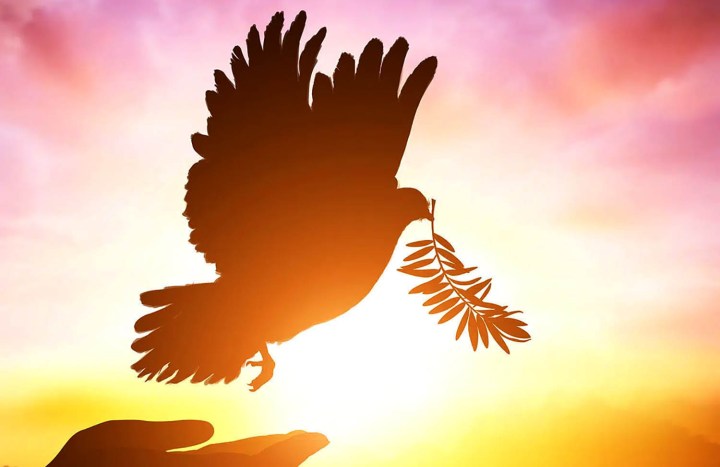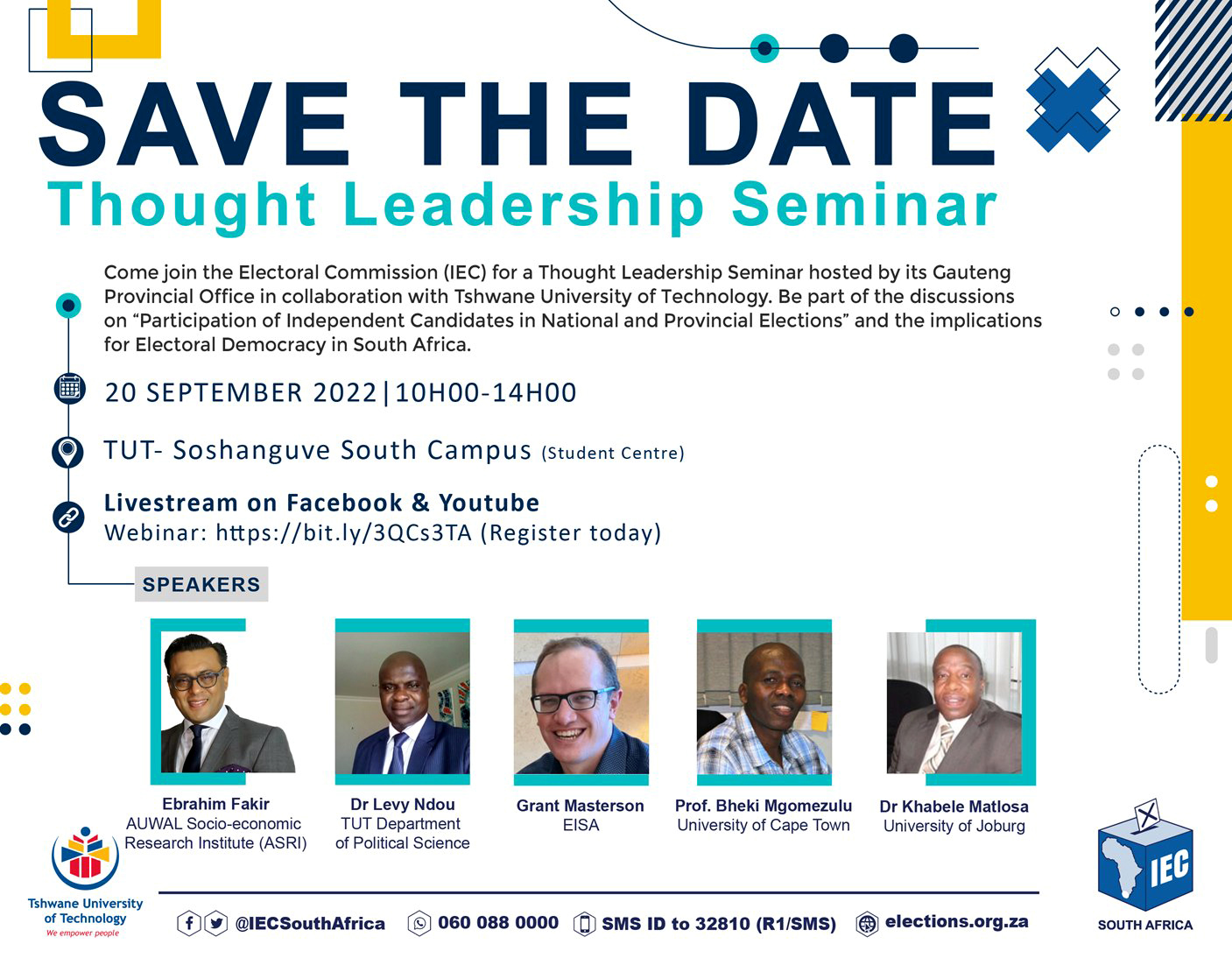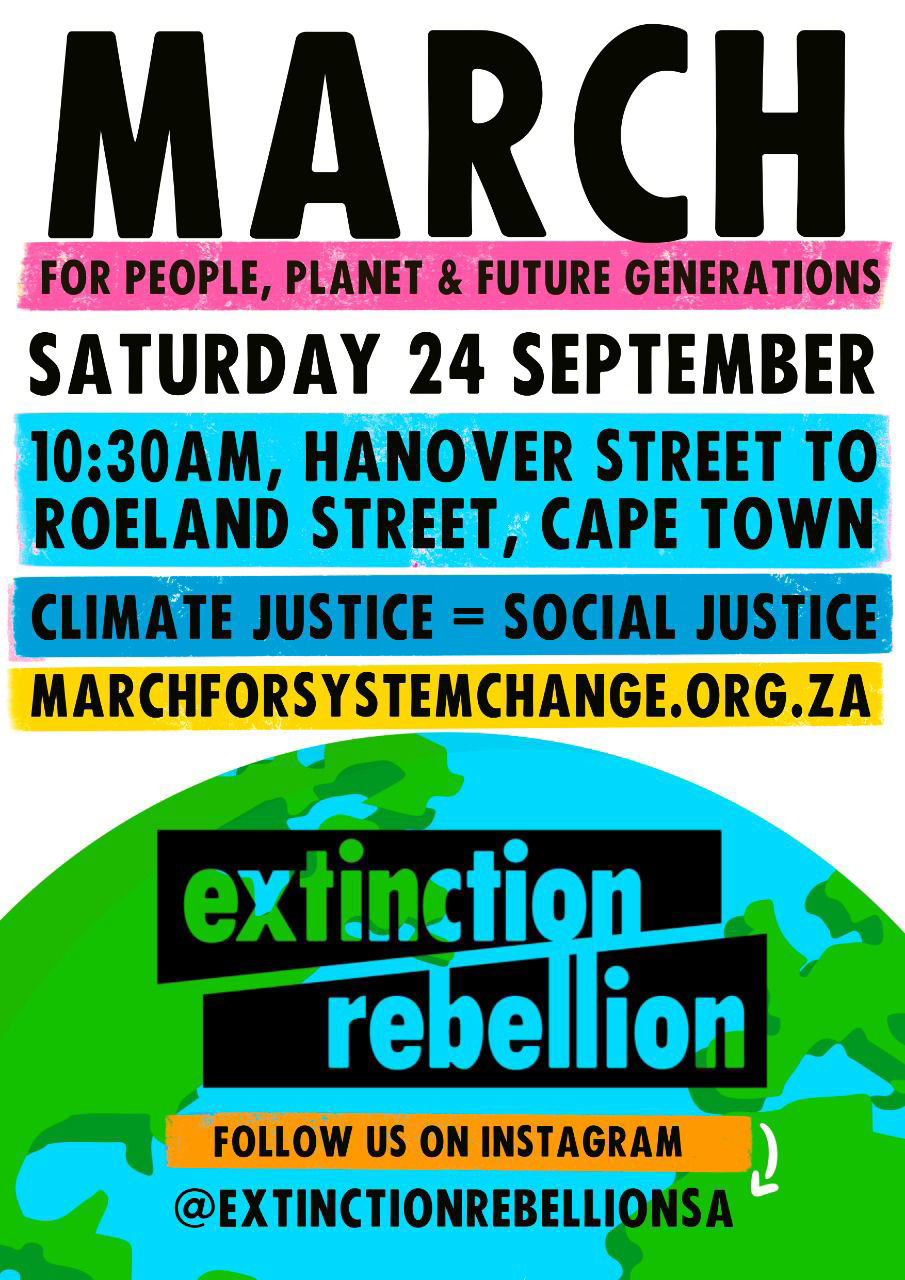CIVIL SOCIETY WATCH 19 - 23 SEPTEMBER
This week — March for system change, International Day of Peace and talk on women’s land rights

The Gauteng provincial office of the IEC, in partnership with the Tshwane University of Technology, is hosting a webinar on the participation of independent candidates in the national and provincial elections; the Trade & Industrial Policy Strategies group is holding a stakeholder engagement workshop on climate-compatible strategies for South Africa’s textiles industry; and climate action organisations are marching for system change in Cape Town.
On Monday, 19 September, at 9.30am, Unicef hosted the national launch of the “Update Study on the Exclusion Error Rate for Children who are eligible to receive the Child Support Grant”.
The event took place at the Capital Menlyn Maine, Pretoria. The study is intended to empower the South African Social Security Agency and the Department of Social Development with the necessary information to improve take-up rates of the grant amongst eligible children.
“[The study] is premised on the importance of ensuring adequate social protection for children, as expressed in the 2030 vision for South Africa, to eliminate income poverty and reduce inequality,” according to the event description.
“It is further underpinned by the fact that the children who are eligible to receive social grants are typically the most vulnerable in society, and the national Constitution obliges the government of South Africa to provide social services, including social assistance benefits to all, especially vulnerable children.”

On Tuesday, 20 September, at 10am, the Gauteng provincial office of the Electoral Commission of South Africa, in partnership with the Tshwane University of Technology (TUT), is hosting a webinar on “The Participation of Independent Candidates in the National and Provincial Elections: Implications for Electoral Democracy in South Africa”.
Among those speaking at the event are Ebrahim Fakir of the Auwal Socio-economic Research Institute; Dr Levy Ndou of the TUT department of political science; Grant Masterson of the Electoral Institute for Sustainable Democracy in Africa; Professor Bheki Mngomezulu of the University of Cape Town; and Dr Khabele Matlosa of the University of Johannesburg.
Register here.
Wednesday 21 September is the International Day of Peace.
The theme for the International Day of Peace 2022 is “End racism. Build peace.” The day is devoted to strengthening the ideals of peace, through observing 24 hours of non-violence.
“…achieving true peace entails much more than laying down arms. It requires the building of societies where all members feel that they can flourish. It involves creating a world in which people are treated equally, regardless of their race,” according to the United Nations (UN) information page on the event.
Tackling racism is an important part of fostering peace. There is a need to dismantle structures that reinforce racism; support movements for equality and human rights; and speak out against hate speech.
“We can promote anti-racism through education and reparatory justice,” stated the UN.

On Wednesday, 21 September, at 9am, the Electoral Commission of South Africa (IEC) is hosting a research seminar on “Safeguarding electoral democracy in the age of growing mistrust”.
During the course of the event, speakers will explore:
- Challenges facing South Africa’s electoral democracy;
- Factors impacting levels of public trust in the country’s political institutions; and
- Innovative ways of restoring public trust in the country’s electoral democracy.
Among those speaking at the event are Sy Mamabolo, CEO of the IEC; Dr Ben Roberts, research director in the Developmental, Capable and Ethical State division of the Human Sciences Research Council; Reza Omar, strategic research director at Citizen Surveys; Susan Tolmay, gender and governance associate at Gender Links; and Dr Collette Schulz-Herzenberg in the department of political science at Stellenbosch University.
Register here.
On Wednesday at 12pm, the Dullah Omar Institute, in collaboration with Let’s Collaborate and Street Law UWC (University of the Western Cape), is hosting a lecture and panel discussion on “Moving from the Era of Separation to the Ubuntu Era”.
The event will take place at the Kader Asmal Moot Court in the faculty of law at UWC. Proceedings will also be streamed via Zoom.
The keynote address will be presented by Eric Sirotkin, a US-based and internationally renowned human rights lawyer. Thereafter, there will be a panel discussion involving South African and US lawyers and activists, including Philip J Daunt, an attorney, mediator and life coach; Dr S Beukes, a human rights lawyer and social justice activist; and Professor Karin van Marle of the department of public and jurisprudence at UWC.
“They will explore the practical application of ubuntu principles to the law, mediation and social change,” according to the event description.
Register here.

On Wednesday at 3pm, the Collective for the Renewal of Africa is hosting a roundtable titled: “Natural Resources, Land Grabbing and Resistance in Africa: Perspectives from Academia and Social Movements”.
“The land question in Africa and elsewhere is intimately linked to issues of citizenship, identity, and notions of political community. In recent decades, land governance and management and systems of distribution, access and control have become increasingly detached from their broader social and cultural meanings, giving way to extractivism and commodification,” according to the event description.
The roundtable aims to explore issues such as:
- The imprints of colonial and racial regimes of ownership in modern juridical formations across Africa;
- The factors driving the private appropriation and accumulation of land and natural resources; and
- The manner in which struggles for land in Africa contribute towards a deeper recognition of multiple subjectivities, agencies and practices.
Among those speaking at the event are Elizabeth Mpofu of the Zimbabwe Smallholder Organic Farmers’ Forum; Bernardo Castro of Rede Terra, Angola; and Natasha Issa Shivji of Cambridge University, Tanzania.
Register here.
On Thursday, 22 September, at 1pm, Both ENDS and the Land Portal Foundation are hosting the third webinar in the “Whose Land? Inclusive Pathways to Land Governance” series. This instalment will focus on transformative approaches to women’s land rights.
“Gender transformative approaches are defined by women acting as agents of change, transforming structural barriers and redefining gender norms. These approaches facilitate the participation of women in land governance decision-making processes, but require closing the land data gender gap,” according to the event description.
Women continue to be excluded from land ownership around the world, due to discriminatory patriarchal systems. On average, women make up less than 20% of the world’s landholders. However, there is a lack of consistent global and national data on the scope of women’s land rights and access.
“This data gap on women’s land rights negatively impacts women and girls. We hear many stories in which women face deprivation of property, legal discrimination, and unequal rights to access, use, inherit, transfer, control, benefit from, and own land.”
The webinar will take place in English, French, Spanish and Bahasa.
Register here.
Visit Daily Maverick’s home page for more news, analysis and investigations

On Thursday at 2pm, the Trade & Industrial Policy Strategies (Tips) group will be hosting a stakeholder engagement workshop on “Designing Climate-Compatible Industrial Strategies for South Africa: The Textiles Value Chain”.
Transitioning to a climate-compatible economy requires the design of climate-compatible industrial development strategies for key value chains in South Africa, including the textiles value chain.
“Moving towards sustainable and circular textiles requires a holistic approach and changes at each stage in the value chain, involving players of all sizes and from all market segments,” according to the event description.
“New business models would have to be adopted on a widespread scale, the use of hazardous substances in textile processing would have to be eliminated, and resources would have to be used much more effectively, with a shift away from fossil fuels towards renewable sources of energy and materials.”
There is also a need to optimise textile use through extending the service life and establishing more post-use options.
“This webinar follows a research study into the environmental sustainability of South Africa’s textiles value chain, with a focus on the manufacturing components of the value chain. The aim of the report is to inform the sector’s path towards climate compatibility.”
Speakers at the event include Dr Nicola Jenkin, director at Pinpoint Sustainability; Elize Hattingh, a researcher for Sustainable Growth at Tips; Zubeida Zwavel, executive director of the Centre for African Resource Efficiency and Sustainability; Hazel Pillay, head of Pick n Pay Clothing; and Sam Smout, GreenCape’s waste sector analyst and a circular economy lead.
A copy of the research paper is available here.
Register for the event here.
On Thursday at 6pm, the Wits Institute for Social and Economic Research is hosting an online discussion titled: “The History of Black Lawyers in South Africa and Beyond II: Debating Pasts and Futures”.
The discussion will explore:
- How best to uncover and narrate the histories of black lawyers in South and Southern African contexts;
- How this work intersects with issues of decolonisation and globalisation;
- How black women in the legal profession have confronted the barriers placed in their way; and
- How Africa-based debates on these issues speak to those emerging from elsewhere in the world.
“This online panel contributes to ongoing efforts to map the pasts as well as the futures of law and society scholarship in Africa,” according to the event description.
Speakers include Mekonnen Firew Ayano of the State University of New York at Buffalo; Thandi Matthews of the University of the Witwatersrand, Johannesburg; Charmika Samaradiwakera-Wijesundara of the University of the Witwatersrand; and Jonathan Klaaren of the University of the Witwatersrand.
Register here.
Also at 6pm on Thursday, the South African College of Applied Psychology is hosting a webinar on “The Relevance of Community-based Approaches to Mental Healthcare in South Africa”.
“South Africa’s White Paper on the Transformation of the Health System argues that a move to community-based health care, specifically mental health, would help reduce the stigma associated with mental illness because community and family involvement would be integral parts of the plan,” according to the event description.
“However, stigma still exists and access to mental health care services has not improved as much as we had hoped since the end of apartheid. We also find that, in the space of mental health care, there still seems to be a large focus on one-on-one interventions, rather than community-based interventions.”
Speakers at the event include Professor Thirusha Naidu, a clinical psychologist and head of the Clinical Psychology Unit at King Dinuzulu Hospital; Grisel Pretorius, who is currently completing her Master of Social Science in Community Mental Health Promotion at the South African College of Applied Psychology; and Mamiki Ramaphakela, an executive director at Gauteng Children’s Rights Committee.
Register here.
Friday 23 September is the International Day of Sign Languages.
The International Day of Sign Languages is intended to support and protect the linguistic identity and cultural diversity of all deaf people and other sign language users.
“During the 2022 celebration of the International Day of Sign Languages, the world will once again highlight the unity generated by our sign languages. Deaf communities, governments and civil society organisations maintain their collective efforts — hand in hand — in fostering, promoting and recognising national sign languages as part of their countries’ vibrant and diverse linguistic landscapes,” according to the UN information page on the event.
“According to the World Federation of the Deaf, there are more than 70 million deaf people worldwide. More than 80% of them live in developing countries. Collectively, they use more than 300 different sign languages.”

On Friday, 23 September, at 1pm, the South African Depression and Anxiety Group is hosting a Facebook live discussion on “Coping with grief and loss after a suicide”.
Clinical psychologist Namrata Ranchhod will join the discussion, alongside Hilda Poo, who will share her personal journey.
Saturday 24 September is Heritage Day in South Africa. It is an opportunity to celebrate the cultural wealth within the country.
“Living heritage is the foundation of all communities and an essential source of identity and continuity,” according to the South African government’s information page on the observance.
“In every community there are living human treasures who possess a high degree of knowledge, skills and history pertaining to different aspects of diverse living heritage. It is therefore important for South Africans to reclaim, restore and preserve these various aspects of living heritage to accelerate the use of living heritage to address challenges communities are facing today.”

On Saturday, 24 September, at 10.30am, Extinction Rebellion South Africa and other climate action organisations are hosting a “March for People, Planet and Future Generations”. Participants will be marching from Hanover Street to Roeland Street in Cape Town in support of system change.
The march will take place just one day after the Global Climate Strike, initiated by Fridays for Future, a youth-led and -organised climate action movement. The strike will see groups across the world march for climate action.
Throughout the week, the 77th United Nations General Assembly will be taking place in New York City, United States. The session opened on Tuesday, 13 September, and will run until Tuesday, 27 September.
A guide to the events that form part of this year’s United Nations General Assembly can be found here. DM/MC



















Comments - Please login in order to comment.